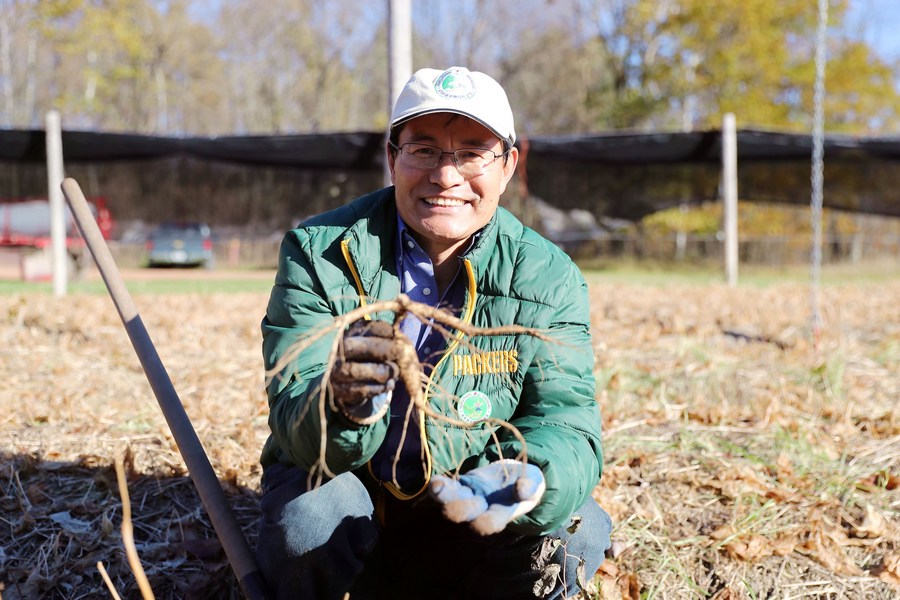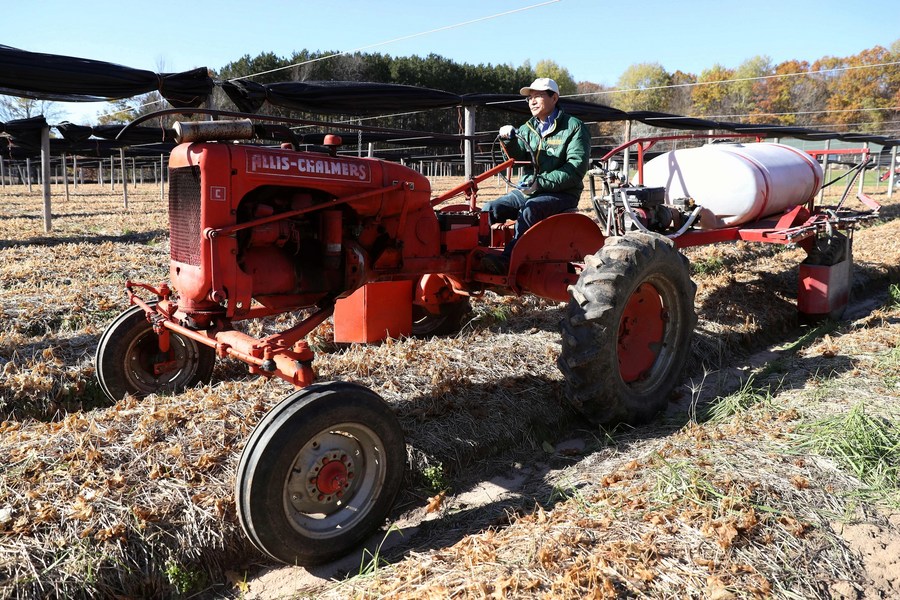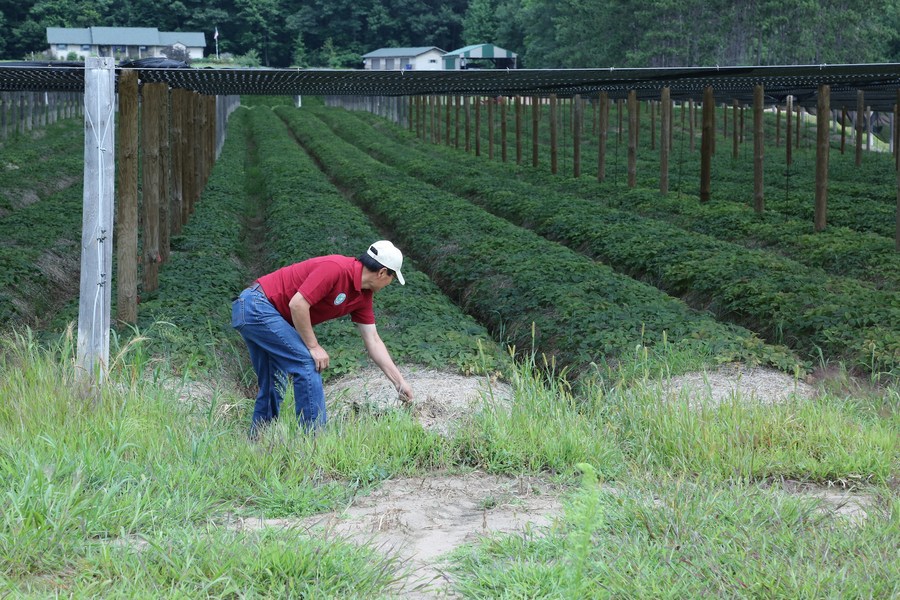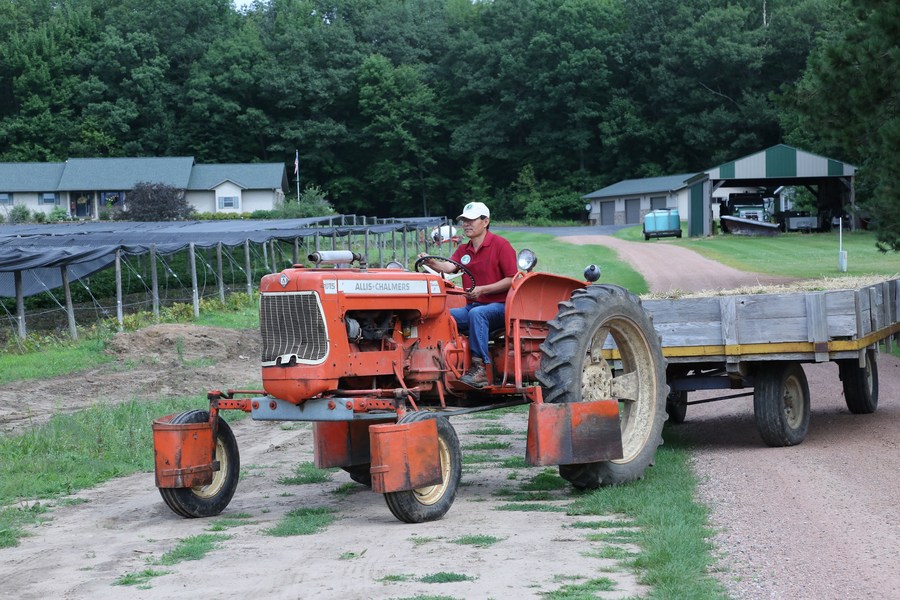CHICAGO, Aug. 9 (Xinhua) -- Jiang Mingtao, a ginseng farmer in Marathon County in the U.S. state of Wisconsin, has maintained the routine daily life of taking care of his ginseng fields, weeding and spreading hay over the field to prevent small animals from digging and eating.
Harvest will start in less than a month, but Jiang is a bit worried. Trade tensions between China and the United States have dealt a big blow to his ginseng cultivation, and now the prevailing COVID-19 pandemic has further plunged the business into a downturn.
"As there are still inventories on the market, we have put off many harvestings to next year, and will probably harvest one-fourth to half of our ginseng field (this year)," Jiang told Xinhua.

File photo taken on Oct. 22, 2018 shows Jiang Mingtao, founder of Marathon Ginseng International Inc., demonstrating how to dig ginseng at a ginseng farm in Marathon County, Wisconsin, the United States. (Xinhua/Wang Ping)
Jiang launched the Marathon Ginseng International Inc. in 2010. With China being a world leading ginseng consumption market, Jiang has been targeting the Chinese market from the beginning. As of 2015, the company exported half of its production to the Chinese market.
The stay-at-home order imposed at the early stage of the COVID-19 pandemic reduced workhands in the farm. Then Chinese buyers and U.S. producers could not travel freely. "We did not have any Chinese purchase so far, the export is hurt dearly."
Jiang attended the first two sessions of China International Import Expo (CIIE) in 2018 and 2019, where he got acquainted with many Chinese businesses and clients and signed letters of intent on cooperation.
"Due to quarantine policies, I cannot attend this year's CIIE," Jiang said sullenly. "But our distribution partners in China may attend the fair."

File photo taken on Oct. 22, 2018 shows Jiang Mingtao, founder of Marathon Ginseng International Inc., working with a tractor at a ginseng farm in Marathon County of Wisconsin state, the United States. (Xinhua/Wang Ping)
Wisconsin ginseng enjoyed a good reputation in China. In 2017, before tariffs started, the state exported 14 million dollars worth of ginseng to China alone, up more than 16 percent from 2016. U.S. total ginseng exports were valued at about 30 million dollars in 2017, and China was the biggest buyer.
Now there are few flights between China and the United States, and Wisconsin's ginseng export to China has decreased dramatically. "Many ginseng farmers (here) plan to retire this year, and are selling their tractors, planters, and ginseng picking machines," Jiang told Xinhua.

File photo taken on Aug. 13, 2019 shows Jiang Mingtao cleaning weeds at his ginseng farmland in Marathon County, Wisconsin, the United States. (Xinhua/Liu Yanan)
As for Jiang, he is shifting focus to sales within the United States. At the early stage of pandemic outbreak, he provided ginseng tea free of charge to more than 1,500 local households. He also promoted wearing masks live and introduced Chinese experiences of quarantine on the company's social media accounts.
"Our Chinese partners sent us protective masks. We also bought some. Together we donated these masks to local hospitals and nursing homes," Jiang said.

File photo taken on Aug. 13, 2019 shows Jiang Mingtao driving a tractor to inspect his ginseng farmland in Marathon County, Wisconsin, the United States. (Xinhua/Liu Yanan)
As for the prospect of ginseng industry, Jiang said, "before the pandemic is over, before China-U.S. relationship improves, I am not optimistic about the ginseng industry."
He noted that ginseng is a famous niche product and has its unique presence in China and the world, and ginseng growing in Wisconsin will continue to be managed in small-scale household model. ■



















Latest comments